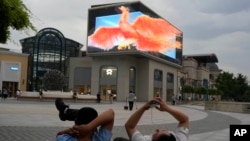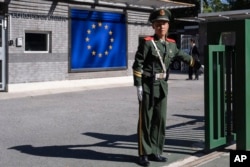Top Chinese leaders will gather in Beijing next month for a key political meeting that will likely reveal details of China's attempts to boost and reform its troubled economy.
The Third Plenum, originally expected to be held last autumn, will occur July 15-18. The party conclave will "examine issues related to comprehensively deepening reform and advancing Chinese modernization," according to China's state-run Xinhua News Agency.
The announcement comes as China struggles to raise economic growth back to pre-pandemic levels, with consumption remaining low and troubles in the property sector persisting.
Data from China's National Bureau of Statistics show that property investment fell 10.1% in the first five months of 2024 from a year ago. New home prices have also been dropping for almost a year.
Meanwhile, consumption in the world's second-largest economy remains persistently weak, with retail sales increasing only 2.3% in April. Some economists predict consumer confidence in China will remain low throughout 2024.
Some analysts say the significant delay in holding the key party conclave suggests a lack of consensus over how to address the long list of domestic economic challenges that China is facing.
"My best guess is that the Third Plenum will propose measures to address the housing market, the restructuring or re-profiling of local government debt, and weak household consumption," Michael Pettis, an expert on the Chinese economy at Peking University, wrote in a report for business consultancy Global Source Partners.
Some experts say that instead of initiating a big structural reform to the Chinese economy, Chinese authorities will focus on boosting consumer and business confidence and rolling out some fiscal reform.
"The Chinese government will try to reassure foreign investors, build up confidence in the labor market, and roll out measures to tackle the fiscal crisis at the local level," said Dexter Roberts, director of China affairs at the University of Montana's Maureen and Mike Mansfield Center.
Ahead of the Third Plenum, Chinese state media have been highlighting the government's efforts to boost domestic consumption.
Xinhua reported that a consumer goods trade-in program the government initiated in March had triggered a rise in sales of cars and home appliances, while another report talked about Beijing's attempt to boost consumer demand in the tourism and automobile sectors.
Chinese President Xi Jinping also tried to reassure investors that China will always remain "open."
"We will ... form a more market-oriented, legal and international business environment," he said during a speech marking the 70th anniversary of the government's "Five Principles of Peaceful Coexistence," which guide China's foreign relations.
Some analysts say Beijing aims to implement the policy agenda that Xi set out for China during the 20th Party Congress in October 2022.
"I think the key theme is likely to be trying to [roll out] structural reforms that help China to become an industrial innovation superpower and boost productivity to combat lagging growth and increase sustainability," Neil Thomas, a fellow for Chinese politics at the New York-based Asia Society Policy Institute, told VOA by phone.
Apart from the domestic challenges, China is also facing mounting economic pressure posed by foreign countries. The United States has been coordinating with some of its allies, including Japan and the Netherlands, to restrict China's access to advanced technologies, such as semiconductor chips.
Meanwhile, the U.S. and European Union have both imposed tariffs on electric vehicles imported from China, while Canada is considering following suit.
To cope with this pressure, China has begun to emphasize letting scientific and technological innovation drive the economy.
During a major science and tech conference in Beijing on June 24, Xi said China needs to "strengthen top-level design and overall planning" and "expedite high-level sci-tech self-reliance" to help China become a leading country in science and technology by 2035.
"The country must further enhance its sense of urgency and intensify its efforts in sci-tech innovation, so as to secure a leading position in sci-tech competition and future development," he said during the conference.
Some experts say Xi's emphasis on science and technology innovation likely suggests the Chinese government will pour more funding into research and development, offer tax incentives for tech companies, and introduce policies during the Third Plenum aimed at fostering a robust innovation ecosystem.
"This will involve creating more favorable conditions for venture capital and private equity investments and improving access to financing for startups and innovative enterprises," Lizzi Lee, a fellow on the Chinese economy at the Asia Society Policy Institute's Center for China Analysis, told VOA in a written response.
Apart from doubling down on the key role of innovation, Xi said China must further centralize the power of leading scientific and technological innovation in the Chinese Communist Party.
Lee said the Chinese government needs to ensure "innovation can thrive within the parameters set by the party" while fostering an environment where "bottom-up, grassroots innovations can emerge."
Judging from the wide range of domestic and international challenges China faces, Thomas in New York said, one of Xi's top priorities will be to strengthen his position in the Chinese Communist Party and further enhance his leadership of the country.
"I expect there'll be further institutional reforms to more deeply embed the party and Xi's leadership over the Chinese economy," he told VOA.








